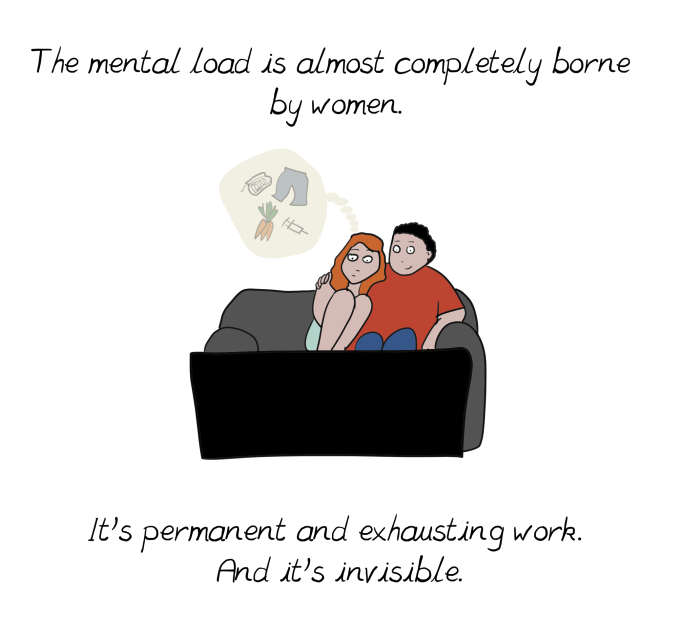Lightening the Load: 5 Ways to Teach Your Partner About Motherhood's Mental Labor
“Walk 10,000 steps”
“Weight lifting is the only way to lose weight”
“Lexapro causes weight gain”
“Are my daughter’s tantrums normal?”
“Is her ear red?”
“is something wrong?”
“Are they eating enough fiber?”
“Ugh, I ate gluten again”
“I didn’t get out a pinterest post”
“I feel so overwhelmed”
“Need to text Jessica back”
“Should we take him out of his current ABA center?”
“What is best for Jake?”
“What will pre-k be like for him?”
“Am I overthinking this?”
“Why isn’t there enough time”
“I need to get more sleep.”
“Did I take my supplements today?”
“How do I get more greens in their meals?”
“I need to make money”
“I need to make money so I can get help with work”
“I need to make Money so I can get more time”
“I need more time”
“I’m not enjoying my time”
“This should be fun”
“I need to talk to Jarrod”
“I need to take a break”
“But then I’m giving up”
“You give up on everything”
“Why is it so much harder for me?”
“Is it like this for other people?”
“Is she even a friend?”
“They say go dairy free but the alternative is even worse”
“Do I need to get rid of all of our products out so we can go clean?”
“Everyone is getting cancer”
“Should we get a dog?”
“ I need to put their clothes away”
“I didn’t make the bed again”
“I forgot to brush their teeth”
“I need to make more friends”
“I don’t have time for friends”
“What if Sydney doesn’t like school?”
“Is she going to get sick a lot?”
“I need to get her vitamins”
“What else does she need for school?”
“I need to work out”
“I need to post a reel”
“I need to create stories”
“I need to engage with other creators”
“ I forgot to return amazon”
This is the motherhood mental load.
When I was growing up I always remember my mom going to bed in the middle of the night.
She always said she had more to do and there were no interruptions at night to get those responsibilities done.
It wasn’t until I became a mother I understood why and followed in her footsteps of a late bedtime.
It’s not just the amount not complete it’s also the amount on my mind.
Recently, I was talking with a friend who was sharing with me how stressful the month of may is for her.
And the thing that stood out the most? Everything on her list was for other people. Not once did she mention anything about herself.
Even self-care with it’s well meaning attempt can add to the mental load.
And truthfully, no massage or 2 hour away are going to solve the weight of never ending list.
I started therapy in January 2023 and was in throws of postpartum with my second child, deep in resentment of my husband’s freedom, and anxiety that would keep me up more than half the night.
The thought that continually came back to me: parenting feels unfair and imbalanced in comparison to my spouse.
Even as I’ve been writing I’ve also been adding to my to do list while also keeping an eye on the monitor meaning my brain is still in responsibility mode while also trying to be creative.
I also have darting around my brain write Sydney’s doctor back, pick up bananas, coordinate pick up, follow up with BCBA…
And the same time an email popped in about schedule changes for Jake’s therapy.
These are all things I’m carrying all the time.
Schedule changes, well check visits, food that doesn’t increase the potential for cavities… on top of work plans and ideas, home management, and time to take care of myself and marriage.
Having a flexible schedule only makes things worse sometimes.
Enter the motherhood mental load: invisible labor which typically falls on a women’s plate.
It’s like having 200 computer tabs open at any given time.
In the article shared above, the researchers use the phrase “cognitive labor” and that’s exactly what it is.
And it is causing burnout, anxiety, and overwhelm.
What is the mental load
The invisible load of motherhood is not cooking dinner… it’s researching recipes, writing down ingredients, and making a plan on when you can get to the store.
It’s the emails you send back and forth to a teacher. Silent threads for your eyes only.
It’s the worrying you have about nutrition, new clothes, getting a birthday present for an upcoming party, and planning for the holidays.
And even deeper than that - it’s not just the birthday party but getting the right and thinking about what a four year old child might like.
And for your own child’s birthday bringing snacks that are nut or allergy free.
Men’s to-do’s tend to be more visible…like a freshly mowed front yard or the trash taken out whereas for the other parent they typically are more behind the scenes.
Jarrod has his own mental load yet statistically the mental load falls on the default parent which usually is MOM.
On Mind Body Green, an article referred to the mental load as worry work and not about the physical tasks but the overseeing of those tasks.
Even in the most progressive of homes like my own where we split a lot of the domestic labor it is still the woman who is the spearhead of the family’s wellbeing especially the children in the home.
Mental load of special needs moms
It is said that women with special needs children have cortisol levels similar to a combat solider.
The unique needs of these children can double or triple the mental load especially if they are non verbal or have limited language skills.
My son who is quite expressive still is unable to answer questions.
He is able to say no to certain foods or activities and requests his wants.
He is unable to tell me what happened during his day or go into more detail about his requests or frustrations.
This creates a guessing game for me.
A lot of mental energy: what does he need? Is he happy there?
Furthermore, leaving him in the care of others is extremely hard to do as I know what he means when he yells out “letter a song”.
The effort that it takes to inform a babysitter of all his language or specific ways is more than just providing a list to her.
It’s predicting and knowing exactly what he needs before he needs it.
Beyond carrying the weight of the needs of the child it also pertains the future…who will take care of my child when I die? Do I have everything in place in order to support them?
For example, I just printed a guardianship letter written to my sister and brother in law about Jake’s specific needs.
Why getting help with physical tasks don’t help the mental burden:
Let’s be real- your spouse may be totally willing to help with your to do list for your child’s upcoming birthday party. They’ll pick up the cake, balloons, and even party favors…but it doesn’t lighten the load - sometimes it can even make it heavier.
The mental labor it takes to prepare and predict is exhausting. However, many of us don’t know how or don’t want to ask for help because we don’t know how — it’s invisible labor, it’s not something we can just pass off.
“You Should Have Asked!”
It a comic titled, “You Should Have Asked,” the author does an amazing job of compiling what the mental load looks like. You can see it here: comic.
I remember when I had just given birth and my parents continually asked, “how can we help?”
Although trying to be helpful, it wasn’t.
It was challenging for me to figure out what to ask for AND then have to teach in order to get it done.
How To Help Your Partner Understand The Mental Load
Jarrod did NOT understand the mental load.
He did not understand all the things it took to make 1 decision.
All he saw was the action.
He does not see the thinking, emailing, or conversations before the decision.
Many millennial men grew up with mom’s at home and so reframing what equal parenting in regards to emotional or cognitive labor can be foreign and something needing to be learned as it wasn’t taught to them.
Women not only have the role models of their own mothers but they also have decades of media to instill the ideals of being a “good mother.”
Along those lines the societal pressure to be a “good mom” is exceptionally high. Did you see my list above? I don’t think previous generations were thinking about cyber bulling or fiber in their child’s diet.
5 ways to teach your partner about the motherhood mental load
1) Sharing: sharing with my partner about what the mental load is and what it feels like
2) Comparing : Jarrod did some self reflection and compared the mental load to a training he lead and thought about the hours and practice that went into it that went unseen
3) Educating: Me sending him instagram reels, accounts, articles all about the mental load
4) Planning: On Sundays we have a weekly meeting that covers finances, intimate time, schedule ahead, and MENTAL LOAD. Within the conversation we talk about who does what and the metal labor that goes with the task at hand.
For example: If your husband is going to make dinner a few times this week— will he also be responsible for finding recipes and getting to the grocery store to get ingredients?
5) Counseling: In January 2024 Jarrod and I started couples therapy. We did it for a multitude of reasons but mostly for communication misses and wanting to up level. Within this period we both learned more about one another and even though we’d been saying similar things to another it was like we finally HEARD the other. Having a “facilitator” was truly helpful with Jarrod understanding what goes on in my brain and have it click for him.
But isn’t this me still working?
Over communication or extra communication can sometimes feel like more work but I promise it actually solves problems in the long run.
It takes the guessing and assuming out of the equation.
But, outlining expectations, needs, and roles can be super helpful in families.
I found that I just became the go to person for all things kid related - like talking to teachers or going to meetings.
It was frustrating because I felt Jarrod was never interrupted in his day to do these things.
Since we’ve had a conversation about this we’ve made effort to put school meetings at a time we can both attend so it feels more equal.
This has helped me feel seen and respected in my role as a mother.
How to ask for help from your partner
Sometimes we need to let things go.
Sometimes we need to say something.
How we say something is extremely important.
The more we nag, attack, blame, and criticize the least likely our partner is going to be empathetic to our situation along with offering to join in and help.
For example: “YOU never help!!”
Here’s why this doesn’t work: the truth is your partner may help - but not in the way you want. Perhaps they are the breadwinner of the family, perhaps they do all the handy work in the house, perhaps they are a coach on the soccer team.
In their mind— this is contributing.
An upgrade: “I feel very overwhelmed with my list this week can we look at it together. I’d love some help on some of the things going on”
Here’s why this works: We first take responsibility for our own needs and wants. Secondly, we involve our partner in our vulnerable state of needing to ask for help. And lastly, this opens it up to talk about what you need help with and how they can actually do this.
Inequality in parenting can cause conflict and ultimately resentment and fall out. Women who take on most of the child rearing tasks than there husband often experience much higher resentment and less likely to share satisfaction in their partnership.
My husband and I have grown every year of our partnership. This is the first year that he’s been able to support bits and pieces of my mental load. And the only way this happened: through open communication.
Want to learn more about the mental load and how to manage it in your partnership? Subscribe to my newsletter as I will be sharing a worksheet to use!!





